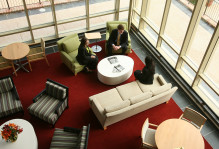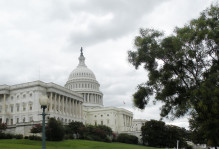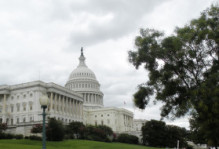The DC Experience /// Site Visits pt. 2
In my last post, I began summarizing my favorite site visits that our Leadership & Community Engagement Institute took during our two week class. Below, I have listed and described four more standout visits.
5. Perhaps one of our most resonating visits came Mike Powell, the son of former Secretary of State, Colin Powell. He opened by sharing his life story with us, beginning with his humble beginnings as a TWAMP (Class of 1985) – a Government major, Yates resident, ROTC cadet and involved student. He continued regaling us with anecdotes from his military career that was unfortunately cut short in an automobile accident while stationed in Germany. Because of the accident, he endured not only an incomprehensible amount of physical pain (he spent a year in the hospital rehabilitating), but emotional pain. Since he was young, he had been working towards a career in the military and following in his father’s footsteps, but his circumstances forced him to change his life’s direction and give up on his dream. These trying times taught Mike to persevere through hardships and redefine success as an attainable end. Following his departure from the military, he tried his hand (and succeeded) in seemingly everything, having attended Georgetown University Law Center, serving a clerk for the DC Court of Appeals, a private attorney and in the Justice Department… not to mention a stint as an advisor to the Department of Defense. He eventually ended up working in the field of communications, serving as the Chairman of the Federal Communications Commission (FCC) from 2001-05, and currently the President of the National Cable & Telecommunications Association. Mike shared insight on his principle-driven leadership style, which is highlighted by his ten core pillars that shape himself and how he leads. He sees them as sacred and unique to every person – so much so, that he refuses to share his own with anybody. To Mike, the contents of one’s character reign paramount when assessing a leader, and their importance cannot ever be understated. The lecture itself was so captivating that by the end of it, I could not believe an hour and a half and elapsed. His stories, life experiences and advice took the shape of a motivational leadership seminar, and they truly inspired every person listening.
6. In terms of community engagement, DC Central Kitchens is likely the organization that is most directly impacting tangible change. We first met with Chief Executive Officer Mike Curtin, who chronicled a brief history of the organization, along with logistical information on how it is run. First and foremost, Mike made it clear that DCCK is not a soup kitchen. Instead, it distributes food to various soup kitchens and shelters around the District; but its primary purpose is to mobilize otherwise underserved individuals into the workforce. Through a training program that lasts several months, DCCK trains individuals to work in the foodservice industry. After they graduate from the program, the Kitchens will hire these individuals and provide them with a living wage and help them find housing in order to be self-sustaining. They will cook and prepare food that in turn goes out to various places, including soup kitchens, shelters, and as of late, to schools in the District. Throughout his presentation, Mike Curtin was very expressive about the role of his organization in providing opportunities for DC residents. He passionately averred that society had forsaken these individuals, and amidst the inefficiency and inaction of Washington bureaucracy, real people were suffering dire consequences. I thought it was particularly interesting when Mike said that DC Central Kitchens will have been considered successful when it can no longer stay open – it is not often that an organization sets out to go out of business and have its services no longer needed. Though its scope may not be as grand as MCC or Aspen (yet), there is no doubt that DCCK plays an incredibly important role in the lives of many underserved individuals, providing them with a venue to turn their lives around and find success.
7. Penelope Spain was one of only two site visits that actually came to visit us at the William & Mary DC office. She has her background in law, having attended Washington College of Law and graduating in 2005. While in law school, Penelope started a club that allowed students to go to a local detention center, and from this emerged Mentoring Today. She chronicled the organization’s beginnings as a group at WCL dedicated to helping incarcerated youth get reassimilated into society – though it remains small (there are 3 full-time employees), the organization has garnered a fair amount of attention and recognition within the DC/Maryland community. She shared with us the intimate inner-workings of Mentoring Today, shedding light on how she runs a nonprofit with such small overhead. Though she has run into her fair share of hardships, she has remained unwavering in her mission to helping the oft-forgotten youth, providing them with the stable figures that have usually been absent in their lives. I loved her passion and drive, along with her do-it-yourself mentality that inspired her to start her own organization – for these reasons, Penelope was one of my favorites of our site visits.
8. William & Mary/Teach For America alumna/Anacostia High School teacher Lauren Sterner marked the final of our site visits, and in my opinion, it was the most profound. It was the only visit in which we got a firsthand view at a community engager in action. We sat in on two sections of Ms. Sterner’s 9th grade English class, and though not every student seemed engaged in curriculum, she did a phenomenal job in captivating the attention of many. Despite a gentrification project that the school has been undertaking for the past few years, the district is still poorly funded – prior to starting her first class, Ms. Sterner explained that several English teachers would be cut due to budgetary restrictions. We witnessed even other poignant examples of this underfunding during the class itself, from the outdated textbooks that were being used (some were even older than the students themselves), to Ms. Sterner’s announcement to the students that the classroom was out of paper. I view individuals like Lauren as champions of education. Despite having other opportunities, both in profession and in location, she chooses to serve those students who need it and can benefit the most, and I find this admirable to the utmost extent. As someone who has a general interest in education, I was inspired and motivated by seeing Lauren in action. Ideally, we would have gotten to speak to her for longer but this site visit nonetheless impacted our class greatly.
As I stated in my previous posts, our two week class was not a William & Mary class in a traditional sense. Sure, we had our fair share of readings, discussions, lectures and writing assignments, but we still found time to visit many outstanding organizations/individuals all around DC. At times, it seemed overwhelming, considering the sheer amount of people and places we visited; nevertheless, I am very thankful to have gained that kind of experience. Perhaps the most enriching part of the two weeks came in the form of exposure. We saw all the shapes and forms that engagement could manifest itself in, from working in international development, to the government, to the classroom. We all learned that there are countless ways to affect positive change within the community, and as leaders, we ought to follow our own path, find our niche, and excel.




No comments.
Comments are currently closed. Comments are closed on all posts older than one year, and for those in our archive.